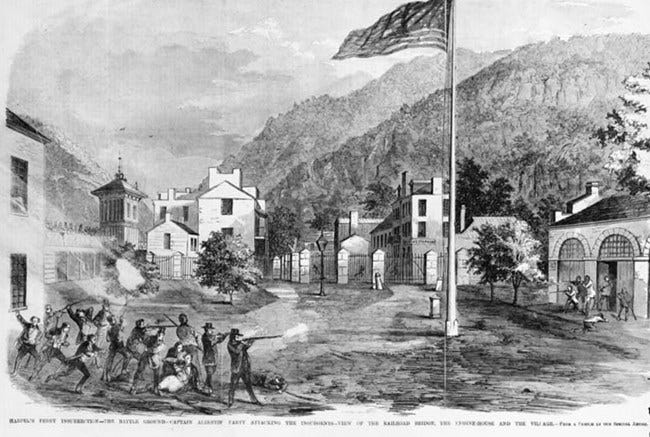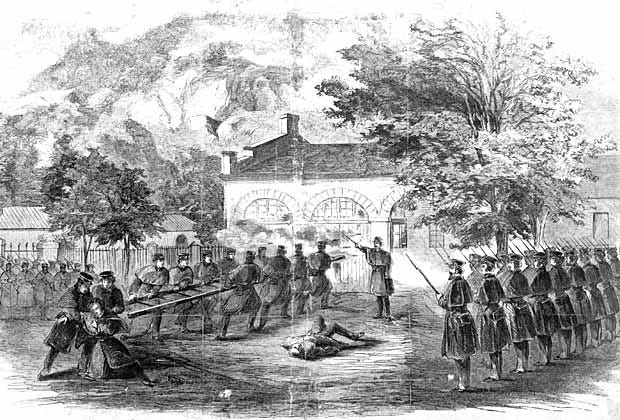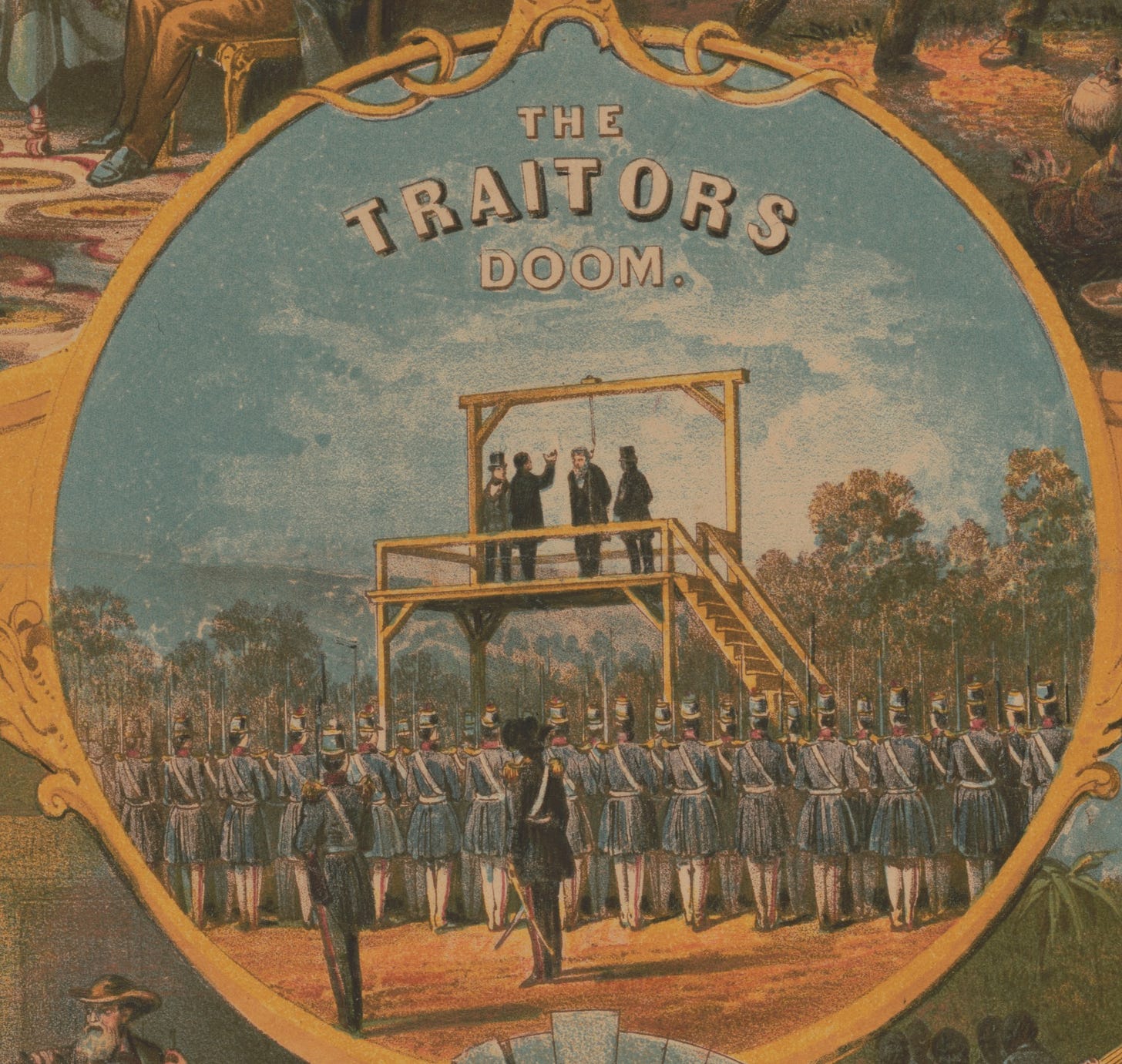How did newspapers react to John Brown's Raid?
Street level chatter
Treasured friends,
I’m still putting the finishing touches on the WW2 revisionism/Xbox 360 episode (paid subscribers are not ready for it yet) so I decided to throw a little bit more content your way.
Following a recent post on a 1940 Western that featured a surprisingly villainous John Brown (a truly evil man who has sadly been rehabilitated) one of our beloved paid subscribers recommended a compendium of documents on John Brown’s Raid on Harper’s Ferry, and at this point I’ve developed the habit of buying any interesting historical book that I’m made aware of for fear that it will eventually go out-of-print or become otherwise impossible to find.
In the book were a few newspaper articles from 1859 that reacted to John Brown’s disastrous raid on Harper’s Ferry. I found these very interesting and will be reproducing them below.
Although it seems a kind of consensus has emerged today in support of Brown (one of the most grim videos I’ve seen recently is of Shane Gillis praising Brown, which is a good indicator of where even nominally friendly normies are on the topic), at the actual time of Brown’s raid it seems like the public was largely hostile because they saw him not as an anti-slavery crusader, but rather as a force trying to tear apart the country and force a conflict. Abolitionists seemed to like him for this same reason.
I think secession was always a dumb idea, and that the South realistically never had any chance of winning the Civil War (at least in the way that secession was sold to the Southern general public), but it’s still understandable why many Americans during this time period came to believe (incorrectly) that a military conflict was inevitable and even necessary. After all, both radical abolitionists and radical secessionists were shouting that lie constantly and worked very hard to make it true.
As the nation reels from Charlie Kirk’s assassination and political polarization more generally, I hope conservatives’ takeaways from these events are not that some big upheaval is inevitable, but rather that they can and must energetically work to stop a big crisis from ever occurring (we are not even close to a civil conflict today). There are lots of forks in the road and, whatever may happen, it’s going to be smart, stable, and well-meaning people who end up impacting the situation for the better rather than excitable (and totally inert) social media addicts who have managed to predict 400 out of the last 0 Second American Civil Wars.
For more information on this period, you can check out my podcasts on the book “War to the Knife,” which covers the Bleeding Kansas Crisis (the bloodiest period of which was kicked off by Brown), the film Ride with the Devil (1999), which is probably the best movie on the American Civil War, covering the irregular conflict in the Kansas and Missouri territories, and the book “A Disease in the Public Mind,” which presents a novel (and convincing) theory that it was actually Massachusetts that caused the Civil War.
Editorials follow below.
Editorial from the New Hampshire Patriot (Northern, Democrat-aligned)
The Harper’s Ferry Affair
October 26, 1859
The public mind throughout the country, during the last week, has been much agitated by the most deplorable events at Harpers Ferry, Va., an account of which we gave in another part of this paper. The circumstances were of a nature to strongly attract public attention. A quiet community, in the night time, was startled by an insurrection in its very midst. The suddenness of the alarm, with the uncertainty of the nature and extent of the danger, at first paralyzed the people for any resistance, and the insurgents, being fully armed, gained possession of the place. But after a bloody conflict, resulting in the loss of twenty-one lives in all, the insurrection was quelled and order returned.
In this atrocious affair there were peculiar features to excite alarm, not only in the community where [it] occurred, but also throughout the country. Although the proposed object of it was the release of the slaves, yet it now clearly appears that they had no part of it. In fact, one of the first victims was a colored man, shot by the insurgents because he refused to join them. The chief actors, and by far the greater number, were white men. Neither was it a sudden outbreak, occasioned by some occurrence in the moment; but it was in pursuance of a plan deliberately considered and formed by men elsewhere, who had gone to that place for the very purpose of making preparations and carrying it into execution. These are the circumstances which render this insurrection of more than ordinary importance and deserving reflection.
Notwithstanding the melancholy result in the loss of so many lives, these events will not be without advantage to the country, if they shall serve to recall the public mind from prejudice and excitement to a clear and honest consideration of the dangerous tendencies of the pernicious doctrines which, during a few years past, have been so zealously taught and advocated by political leaders and partisan preachers here at the North. It is not a long time since not only on the stump, but even from the pulpit, “Sharpe’s rifles” were recommended and applauded as the proper and best means for the relief of “bleeding Kansas.” We then denounced those principles as deserving the severest condemnation, not more, certainly, on account of the circumstances of the particular case to which they were admitted, than for their dangerous and fatal tendencies, if ever admitted as proper in practice. We could not admit violence or force as, in any case, a necessary or proper recourse, in this country, for the establishment of any political principles, or for relief from political evils. But we did not then expect so soon to see so striking a proof and illustration of the correctness of our views, as is now offered by these tragical events at Harpers Ferry. They are the natural and perfect fruit of the seed sown in Kansas. The instigator and leader at Harpers Ferry was Capt. John Brown of Kansas notoriety; his confederates here were his associates there, and the arms used were the very same “Sharpe’s rifles” furnished for use in Kansas. It seems appropriate that it should have been so, and we may add, almost providential that these circumstances should thus concur to connect and identify the one transaction with the other. Gerrit Smith, in his letter to Brown enclosing funds to aid him in carrying into execution his nefarious schemes at Harpers Ferry, very truly and correctly calls it “Kansas work.” It was, in principle, the same.
Those black republicans who have heretofore been so loud in their applause and instigation of the work of violence and bloodshed in Kansas, now seek to relieve themselves form the unfavorable consequences in the public mind of their recent “Kansas work” on another field, by stigmatizing Brown and his associates as fools and maniacs. It is true that extreme folly and madness are apparent in this Harpers Ferry affair; but that folly and madness were not so much error on their part with regard to the principle of the “Kansas work,” as in the hopeless circumstances for success under which they undertook to carry it into practice. But in what position does this new view by these defenders of black republicanism, place that party? If Brown and his confederates were fools and madmen at Harpers Ferry, may they not have been such in Kansas also? And if so, who shall say how much of the wrong in that unfortunate territory is justly to be charged against those who were the instigators of these fools and madmen, and who placed in their hands the weapons for violence and bloodshed!
In the developments made by Brown and others since their capture, are many things for consideration> We have not time or room to refer to them particularly. We hope the people of this State will carefully read the accounts of them for themselves. We wish, however, to call to attention the statement by Brown of his motives for going to Kansas—that it was not for the purpose of making his home there, but to take part in its troubles. We all know how conspicuous and violent a part he took.—This shows how true is the charge, which has been so persistently denied by our opponents, that many of the misfortunes of that Territory have been owing to the interference and instigation of those abroad who really had no interest in it or care for it, except so far as it could be used for political and partisan purposes.
Let us not be misunderstood. We do not intend to charge all the members of the black republican party as being responsible for this deplorable affair at Harpers Ferry. On the contrary, we know that most of them will denounce it in as strong terms as we do, and as it deserves. But we ask them to consider whether, if not the fair and natural consequence, it is not at least the probable effect of the principles and doctrine of arms and violence advocated by the black republican leaders for the relief of Kansas, and of the doctrine of '“Irresponsible conflict” which they are now urged to make the sum and substance of their political faith. For if such be their view of it, we know the people of this State will not support a party from whose principles or acts results so, not only to the peace but even to the continuance of the Union, are in any degree likely to follow.
Editorial from The Petersburg Express (Southern, Secessionist-aligned)
The Harpers Ferry Conspiracy
October 25, 1859
The Insurrection
This Harpers Ferry affair is but a small eruption on the surface of a diseased body. Brown and his desperados are but a sign of the cancerous disease with which a great part of northenr society is polluted by the tratirous views of men who have been rasied to honor, and surrounded by applause, and maintained in power, by whole communities, and even whole States. What Seward teaches from New York State, Wilson and Sumner from Massachusetts, Fessenden from Maine, Chase from Ohio, Collamer from Vermont, Grow from Pennsylvania1—what public prints, that flourish to vigorously to be the mere propagandist of fanaticism supported by a small fraction of society—the Tribunes and Eras, and the like—teach—all lead inevitably to collision as bitter as the late affair, but widespread as the lines which divide southern institutions from northern. The Harpers Ferry affair was but premature fruit. A whole harvest of sterner rebellion and bloodier collision is growing up and ripening from the seed these men have sown.
Disguise it as we may, large portions of the North are our enemies—more bitter, more deadly hostile than through hereditary enmity had pitched their opposing hosts on a hundred battle-fields. The spirit of the effort to wrest Kansas from slavery, made by the concert of a party which polled more than a million votes at the last Presidential election, is manifest enough from the dead and captured agents fo the bloody design at Harpers Ferry. Had one of the men of the irresponsible conflict school occupied the Presidency in the last five days, who can tell the bloody news which would, at this instant, be ringing through the land?
Unless a change—a speedy and effectual change—sweep over northern society, the great conflict must come.
Can we do more than hope that the change may come? Can we do less than prepare for its alternative? Shall we go to sleep with such a warning ringing in our ears?
The South has a work before her, which she must do, unless she is content to lie down in blindness and let an enemy steal away her strength. We can force northern communities to cultivate fraternity and to clear themselves of the pollution in their midst. We can cut off, by our own voluntary act, the trade which makes them prosperous, and build up our energies qat home. And we can arm—aye, arm!
If our young men will do their duty, we shall see, instead of three companies with meagre ranks, in this city, and a few here and there scattered int he country around, whole regiments spring up. Every militiaman should be armed and drilled. The smallest sacrifice of time or money on the part of our people is requisite to give us men enough for any emergency, as ready for work as the gallant volunteers which sprang to the call of the Governor in the late danger. No one knows how soon this may be necessary, but all can see that preparation may be the only security.
Editorial from the Albany, New York, Evening Journal (Northern, Republican-aligned)
From the Philadelphia Press [This appears to be a response to another paper’s editorial]
November 30, 1859
“We do not believe there is any purpose, such as the Enquirer intimates, to attempt the rescue of John Brown on the 2nd of December. We do not believe that any body of men would make such an experiment, especially in view of the somewhat formal preparations of the military of the gallant State. John Brown will meet his fate, whether as a bad man or as a madman, with comparative little sympathy. Our own belief is that he should not be executed; but if the seeds of future excitement are planted on his tomb, we do not doubt it will be found that they were planted there as well by his Southern enemies as by his Northern sympathizers.”
Whatever of the sympathy the fate of John Brown awakens, will be occasioned by his bearing through an ordeal so trying, rather than any complicity of feeling in his lawless enterprise. Upon the question whether he had any right to go there with such intentions, or whether, when taken, he ought to be punished, there is no general difference of opinion or sentiment. Through we “would that all men” were Free, we should as readily go to Viriginia to run off their Horses and Cattle, as their Slaves. By the Constitution and Laws, Slavery is recognized and tolerated. It was a compact made by our Fathers, and one that binds their heirs. We will oppose both its extension and its encroachments. Thus far, and no farther, goes our sense of duty to Freedom.
John Brown seems to have counted the cost of his enterprise; and, like a brave man, is prepared to meet his fate. Since the day that Paul spoke to Agrippa,2 we have read nothing more truly sublime than John Brown’s response to the Tribunal before which he stood to receive Sentence of Death.
[Note from me: During Brown’s final speech at trial, which is what this editorial is referring to, Brown falsely claimed “I never had any design against the life of any person, nor any disposition to commit treason, or excite slaves to rebel, or make any general insurrection. I never encouraged any man to do so, but always discouraged any idea of that kind.” This was a truly shameless lie that was eagerly adopted and repeated by abolitionist papers and politicians as the speech became more and more widely reprinted, which is something that predictably drove Southerners, even those who were moderate on slavery and opposed to secession, mad. I imagine it was similar to how I felt when liberals would insist that that Kyle Rittenhouse was the aggressor during the Kenosha shooting, even though the incident had been caught on video and was clearly self-defense.]
The “pomp and circumstance of War” with which the execution of Brown is to be surrounded, was wholly unnecessary. The rescue rumors were entirely unfounded. ALl this display of Troops is for effect. Gov. Wise intends to make what capital can be made out of this execution.
We agree with the “Press” in the opinion that in this case forbearance would be wisdom, though neither John Brown nor his Family ask it. But Gov. Wise is entitled to and means to insist upon all that is “Nominated in the bond.” And John Brown, imbued with the conviction that “hanging is the best use” that can be made of him, calmly awaits the day and hour of his doom.
Most recent podcast episodes:
Ep73: I hated normieslop F1 the Movie (2025) in a way I didn’t think possible (Paid)
Ep69: Zen police ultraviolence simulator Ready or Not (2023) is the only game for our time (Paid)
Ep68: “Days of Rage” is the most important book for you to read today, right now (Paid)
Ep66: Mission Impossible has fallen (Paid)
Ep65: The definitive introduction to LOST: Season 1, objectively the best television ever produced (Paid)
Abolitionist US Senators
A biblical reference to Acts 25:13-26:32, in which the apostle Paul advocates Christianity to King Agrippa II.








Incredible find! These editorials could have been written directly after Charlie Kirk's assassination or after any of the BLM arson/beatings. What consequences must be leveled "against those who were the instigators of these fools and madmen, and who placed in their hands the weapons for violence and bloodshed!" I'm struck by how level-headed men across time can react in the same way to their own era's troubles and see clearly the stakes.
Until this moment, I did not realize the direct connection John Brown had to stirring up violence in the new states (which led the South to fear problems with expansion) and the military insurrection at Harpers Ferry (which led the South to fear imminent incursions and seizures). Certain men in history seem gifted with the ability to destroy and sow chaos, like John Brown or politicians like UK PM Tony Blair (behind the multiculturalism push, mass immigration, speech criminal codes, etc.). Like a pestilence to the land, they cause utter ruin wherever they go especially at key chokepoints. Then there are men of radiant light like our Dear President Donald J. Trump who build and protect wherever they go. There is a cosmic dimension to the conflicts we face here on this celestial plain.
Reading the primary sources for historical events is always eye opening. Thanks for these!